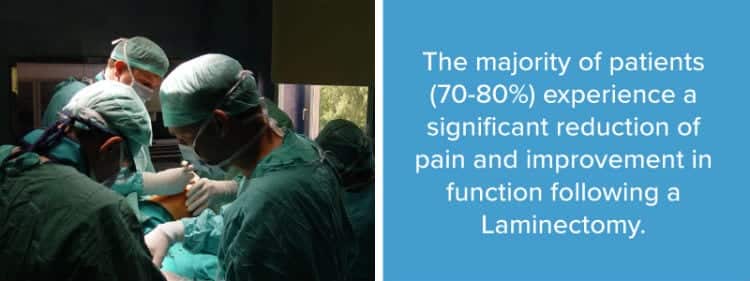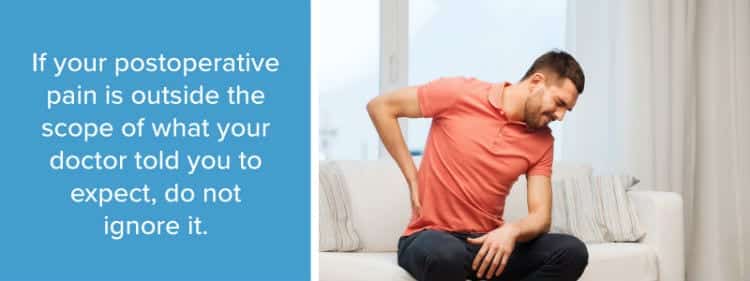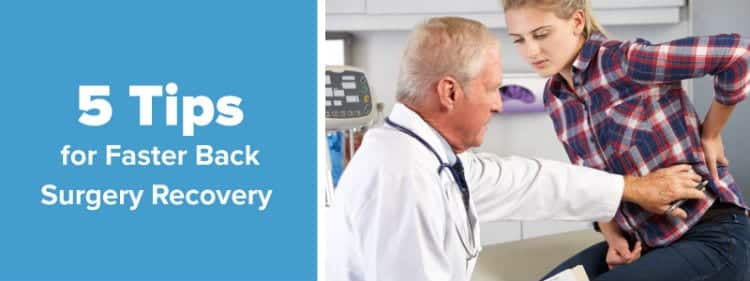Back pain is a common problem that many individuals face due to stress, strain, and the natural aging process. While conservative treatments like heat, ice, and physical therapy often alleviate discomfort for the majority, some cases necessitate surgical intervention to avoid any risks of the condition worsening. For those requiring surgical solutions, the focus naturally shifts to ensuring a smooth and speedy recovery. Understanding the factors that influence recovery time, such as age, overall health, the severity of the back injury, and the type of surgery performed, can significantly impact the recovery process.
At NJ Spine & Orthopedic, we offer various surgical procedures to address back pain, including discectomy, disc replacement, laminectomy, and spinal fusion. Each procedure targets specific issues, from alleviating nerve pressure to stabilizing the spine. Post-surgery, your recovery journey is crucial, and preparing adequately can make a significant difference. To help you navigate this period, we have compiled five essential tips for a speedy back surgery recovery. These guidelines are designed to optimize your healing process, allowing you to return to your daily activities with minimal discomfort and maximum efficiency.
5 Most Common Types of Back Surgery
Back pain is a common problem. Stress and strain, not to mention aging, are inevitable. In most cases, conservative approaches like heat, ice, and physical therapy are effective ways to address this discomfort. In fact, 90% of the millions of Americans who suffer from back pain will recover without surgical intervention. However, if you need surgery to address your back pain, your healing time is probably one of your biggest concerns.
Your recovery time will depend a lot on many things, including your age, your overall health, the severity of your back injury, and what kind of surgery you have. Some of the more common types of back surgery NJ Spine & Orthopedic offers include:
Discectomy
Discs separate each of the vertebrae in your spine. If one of these discs is damaged or slips out of place, it can place pressure on nerves in your back and cause significant pain. During a discectomy procedure, a surgeon will remove part of that disc to alleviate the pressure it is putting on the nerves. After undergoing a lumbar microdiscectomy, patients can expect to limit movement for six weeks.
Disc Replacement
In some cases, a disc can be so worn out that it needs to be replaced. If this is the case, you may be a candidate for artificial disc replacement. During the procedure, a surgeon will remove an entire disc and replace it with an artificial one made of either metal or a combination of metal and plastic. The surgical procedure will take two to three hours, and you can expect to stay in the hospital for one to three days following the procedure. You will likely be encouraged to walk the first day after undergoing the procedure.
Laminectomy
The lamina is the part of the vertebrae that helps cover the spinal canal. Sometimes, this part of the bone can put pressure on the nerves in the spinal canal. During a laminectomy, a surgeon will remove all or part of a lamina. This can relieve the pressure causing your back pain. The majority of patients (70-80%) experience a significant reduction of pain and improvement in function following this surgery. Most laminectomy patients return to basic activities within a few days or weeks, while full, normal activity may need to wait for a few months.
Spinal Fusion
Spinal fusion can be used to treat lumbar degenerative disc disease, lumbar spondylolisthesis, and several other issues that cause pain in a vertebral segment. During this procedure, surgeons fuse together vertebrae at the site of pain, limiting movement that causes pain. Most patients will be past the most significant postoperative pain one month following the procedure. Physical therapy may be prescribed for up to three months.
Many other procedures address back pain, and if you need surgery, your doctor will help you understand your options.
5 Tips for Faster Back Surgery Recovery
Once you know you are getting surgery, you can start to think ahead to your postoperative recovery. Here are five ways you can speed up your recovery time from back surgery.

Follow Your Doctor’s Postoperative Plan
The most important thing is to listen to your doctor’s directions for postoperative recovery. Before surgery, your surgeon will carefully outline your recovery plan, including realistic expectations for pain management and return to normal activities. While some of the restrictions may seem burdensome, do not push yourself beyond what your doctor recommends. These recommendations are designed to give your body the time it needs to heal properly.
Your surgeon is going to recommend plenty of rest, which can be frustrating for people who are used to being physically active. Pain treatment may seem frustrating, but it’s important to remind yourself that self-care is productive, though it may not feel like it. Be sure you also understand what medications you will be taking for pain treatment and how often you will need to take them. If you are planning to have a friend, child, or spouse help you during recovery, it can be beneficial to let them know your medication schedule so that they can help you stay on track.
Remember that getting better is a gradual process. Many patients experience emotional downswings following surgery, and it can be easy to let those feelings take over. However, make a conscious effort to focus on other things. A positive and goal-oriented mindset can be a significant help during your recovery period.

Don’t Ignore Your Pain
Pain is an expected part of recovery from any type of successful surgery, but different types of pain mean different things. Before the procedure, talk with your surgeon to get a comprehensive idea of what you should expect when it comes to pain. How severe will it be? Where will you feel it? How long will it last?
Knowing what to expect will help you know whether what you are feeling is normal or warrants contacting your doctor. Some pain may be completely normal, while other types can indicate a complication from surgery.
If your postoperative pain is outside the scope of what your doctor told you to expect, do not ignore it. For example, pain or swelling located in your arm or leg could indicate a blood clot. Blood clots are a risk with any surgery because the lack of movement decreases blood flow. Severe pain at the site of surgery could also indicate infection. Carefully monitor your pain during your postoperative recovery, and think about what your doctor told you to expect.
Even if you are only experiencing expected, normal levels of pain, it is important to control it. Here are a few ways you can manage your post-surgery pain:
- Wear a brace: Following certain spine surgeries, your doctor will recommend that you wear a brace. Wearing a brace will help you keep your back in the right position, potentially alleviating discomfort from accidental slouching. Remember to wear a comfortable shirt beneath the brace to avoid irritating your skin.
- Use heat and ice: Alternating heat and ice packs on your back can help ease your pain, but be careful not to get the site of the surgery wet until your doctor has cleared you to do so.
- Take pain medication: Your pain control options could include opioids, non-steroidal anti-inflammatory drugs, and local anesthetics. It is important that you follow the medication instructions closely, and it can help to ask a family member or friend to manage your medication schedule.

Prepare Your Home for Optimal Recovery
Recovery time from spinal surgery varies on a case-by-case basis, but you can expect to spend a good chunk of time recuperating at home. This means you should prepare your home ahead of time. The more comfortable your recovery space, the easier your rest period will be. Here are a few ways you can prepare the major rooms in your home:
- Bedroom. First things first, think about where your bed is located. Is it on the first floor? If not, move it to the first floor if possible. Next, think about everything you will need while you are recuperating. Have a medication organizer ready, and consider keeping a cane or walker by your bed for when you are ready for some mobility.
- Convenience. Next, think about everything you will need while you are recuperating. Place as many of those items as you can within easy reach. This might mean bringing a TV or table close to the bed or moving your phone charger to a bedside table.
- Bathroom. If possible, make sure your bathroom is on the same floor as your bed. A toilet riser and shower chair may also make your daily routines easier. Remember to have plenty of toilet paper available, too, since you won’t be able to make a trip to the store if you run out.
- Kitchen. Take dishes and silverware out of cabinets that will be hard to reach during your recovery. You will also want to stock up on easily prepared meals. Remember that healthier foods will help you in your recovery. It is ok to indulge in unhealthy snacks but do your best to stick to an overall healthy diet.
Not everyone can have a person with them 24 hours a day during their recovery, but you should aim to have a loved one check in on you regularly. This person can help you with the things you can’t reach and run to the store for anything you need

Commit to Physical Therapy
Surgery is not the final step in addressing back pain. Following your surgery, you will spend at least a few weeks of physical therapy. Physical therapy is designed to help your body reach optimal recovery, but it can be very difficult. Push yourself to follow all of your therapist’s instructions as closely as possible. This can help significantly speed up your recovery time.
Physical therapy will likely focus on the muscles surrounding the injury and the site of surgery. The exercises your therapist has you perform will provide more stability to the area and help prevent future problems.
Physical therapy does not stop once you and your therapist part ways, though. Your therapist will send you home with exercises to do, and it’s important to stay on track with these at-home activities.
Focus on Building Healthy Habits
While you are recovering, it can be tempting to indulge in junk food and other bad habits. These indulgences might make you feel better in the short term, but they will likely hinder your recovery. Here are a few postoperative healthy habits to adopt:
- Healthy diet: During your recovery time, your body is going to need additional calories to fuel its recovery, but these extra calories do not need to come from fatty foods and sweets. Instead, focus on fresh fruits and vegetables, grains, high-protein foods, and other nutritious options. It is also important to stay hydrated and drink plenty of water.
- No smoking and drinking: Smoking and excessive drinking are not healthy habits for anyone, and this is especially true while recovering from surgery. If you are a smoker, try to avoid cigarettes during your recovery. Likewise, alcohol can have dangerous interactions with the pain medications you will need to take post-surgery.
- Stick to a sleep schedule: You need a good amount of sleep for a speedy recovery. This can be hard to achieve with the discomfort you may experience, but try to build a sleep schedule and stick to it. If you feel yourself drifting in the middle of the day, try to distract yourself with some kind of entertainment.
- Exercise: Check with your doctor and physical therapist on appropriate exercises that can help speed up your recovery. This habit is also a good one to stick with after your recovery. Regular exercise can help you maintain a healthy weight, which is vital to avoiding future back issues.
- Focus on good posture: Good posture can help you avoid discomfort during your recovery and achieve proper spine alignment. To remind yourself to maintain good posture, try changing positions frequently while you rest. You can also get low back support pillows to help you with your posture.
These general back surgery recovery and treatment tips can be helpful, but the first step on the road to addressing your back pain is connecting with the right doctor. The right physician will help you reach a diagnosis, build a treatment plan, and put you on the path to swift recovery.
Additional Notes About Recovering From Back Surgery
Beyond the above tips, there are various other things to keep in mind about recovering from back surgery. These include:
Intimacy Is Not Completely off the Table During Your Recovery
Because you’re expected to limit your activity after surgery, that often means sex is prohibited. With back surgery, you have to be mindful of how you’re moving your body, but that doesn’t mean you have to give up sexual intimacy. You can ask your doctor when it’s safe to engage in sexual activity and which positions will cause less back strain. Being upfront with your doctor and proactive about preventing injury during your recovery period could mean that sex isn’t off-limits.
You Will Have to Take Care of Your Surgical Wound
While you’re recovering from your surgery, you’ll be responsible for taking care of your incision wound. It will need special treatment care to ensure that it doesn’t get infected. For example, you may need to change your bandages periodically. You’ll have to clean the wound carefully to not damage the skin and delay healing, and avoid any risks of further injury.
In some cases, you will have to prevent your wound from getting wet for some time. Also, you should be aware of signs of infection in case they occur so that you can alert your doctor. You’ll have to monitor the condition of your wound and watch out for symptoms such as swelling, discharge, odor, and fever.
You Can Buy Things to Make Your Recovery Period Easier
Activities in your daily life will become more challenging during your recovery period. For example, we don’t always consider how much movement goes into our daily hygiene. Something as simple as using the restroom or cleaning yourself in the shower could be complicated or risk further damage.
Fortunately, there are many tools that you can incorporate into your recovery period to ensure that you can still manage these daily activities. Some useful products to keep nearby could be slip-on shoes so that you don’t have to bend over and tie your shoelaces, along with grabbers so that you don’t have to strain yourself while reaching for things.
The Experts at NJ Spine & Orthopedic Can Help You with Your Back Surgery Recovery
NJ Spine & Orthopedic is staffed with board-certified physicians and medical experts. Back surgery recovery isn’t just about medication, exercise, and wound care. You need skilled spine specialists to guide you through the process and make your recovery easier. Our doctors are skilled at identifying causes of pain and can advise you on the best course of treatment. They are also skilled at performing minimally invasive laser spine surgery, which has the advantage of shorter recovery times and reduced pain when healing.
A variety of factors can exacerbate your pain during your back surgery recovery. Make sure you’re getting the best care with the shortest recovery time by contacting skilled spine doctors who are members of organizations like the American College of Physicians and the Society for Minimally Invasive Spine Surgery. Call (866) 553-0612 or fill out our contact form to schedule an appointment with one of our skilled spine experts.

